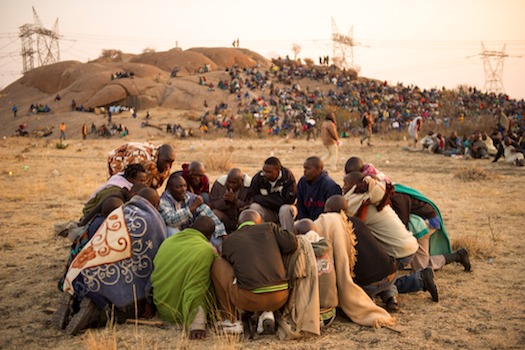- About
- Topics
- Story
- In-Depth
- Picks
- Opinion
- News
- Donate
- Signup for our newsletterOur Editors' Best Picks.Send
Read, Debate: Engage.
| March 27, 2018 | |
|---|---|
| topic: | Economic Fairness |
| tags: | #land grabs, #ANC, #Africa |
| located: | South Africa |
| by: | Shasha Seakamela |
The South African government will now begin to reclaim land taken from black people near a century ago without payback to the current, white owners, dividing public sentiment, and heightening fears of a ‘land-grab’ and cries for justice.
On February 27, South African parliamentarians overwhelmingly voted in favour to amend the constitution to allow land expropriation without compensation.
The Natives Land Act of 1913 dispossessed black South Africans and prevented them from competing with white farmworkers for jobs. Under the Black Land Act, which came into force on 19 June 1913, black South Africans were no longer be able to own, or even rent, land outside of designated reserves. These reserves not only amounted to just 7-8% of South Africa's land but were also less fertile than lands set aside for white owners. The Natives Land Act was by no means the beginning of dispossession. White South Africans had already appropriated much of the land through colonial conquest and legislation, and this would become a vital point in the post-Apartheid era.
In a recent speech, the Economic Freedom Fighters leader, Julius Malema reaffirmed his support for the expropriation of land without compensation. “We want to give land to our people, it is going to happen, it will happen in our lifetime, whether they like it or not. The land will be returned. We are not going to listen to any Britain, we are not going to listen to the European Parliament, we are not going to listen to the UN… we are going to listen to the people of South Africa”.
Some view this as a ‘land-grab’, or ‘New Zimbabwe’ while others view it as something historical, as it corrects apartheid-era wrongs. Some from the white communities call this a ‘big crisis.’ However, like all South African crises, this one will also end in a compromise – its details have been discussed by lawyers and reported by newspapers.
In this sense, the land-expropriation moves are simply a tactic to create more modest changes in society. Crisis drives change because elites have avoided negotiating economic reforms which will redress past wrongs while protecting the assets of investors who play by the rules. This forces black people to get angry if they want to be heard and will create new crises if it is not addressed now. Some media experts believe forcing change on the owners of capital will kill investment and growth – ignoring demands for reform will trigger costly resistance.
Parliament accepted the principle of land expropriation without compensation, but with the qualifications that it cannot impact negatively on food production and food security in the country.
South African President Cyril Ramaphosa has since assured the National House of Traditional Leaders that they would be properly consulted on the land issue. He said there was no reason to ‘panic and start beating war drums’.
The president said it was safe to continue investing in land and that it was important that farming activities continue as normal. “We are going to handle this matter in the way we've always handled difficult issues in our country: by dialogue‚ discussion‚ engagement‚ until we find good solutions that will take our country forward”, Ramaphosa said.
The ruling African National Congress has for many years promised reforms to redress racial disparities in land ownership, however, this subject had remained highly emotive more than two decades after the end of apartheid. Whites still own most of South Africa’s land following centuries of brutal colonial dispossession. Black people and government together own about 26% of commercial agricultural land, up from 14% when apartheid formally ended in 1994.
On the other hand, civil rights group AfriForum has said it will launch an international campaign to inform governments and foreign investors “that property rights in South Africa are being threatened”, it said in a statement. AfriForum, an organisation that mostly represents white South Africans on issues like affirmative action, said foreign investments in South Africa will also not be safe should plans for land expropriation without compensation go ahead. Kallie Kriel, CEO of AfriForum, said land expropriation “could unleash conflict in the country”. Kriel did not elaborate furthere. He said AfriForum will lobby South African trade partners and ask countries whose citizens own land in the country to put pressure on Pretoria to stop the process of land expropriation.
Under Ramaphosa’s watchful eye, I still believe that overall the issue of land reform will be handled with a skilled and gentle hand by the government. The land issue is an enormous opportunity. We should use this to surprise the world one more time. Instead of doing what they all anticipate – i.e. grabbing land and dramatically increasing racial tensions, we should do the opposite.
By copying the embed code below, you agree to adhere to our republishing guidelines.
